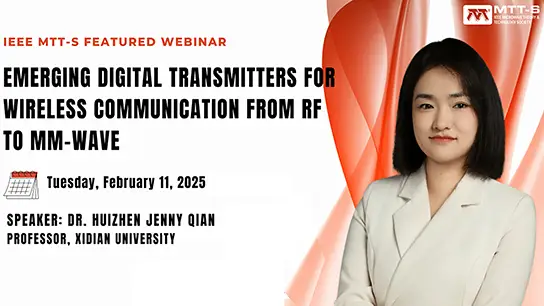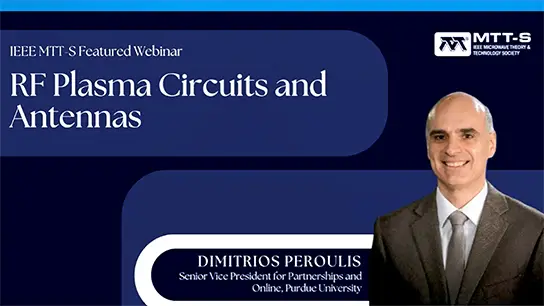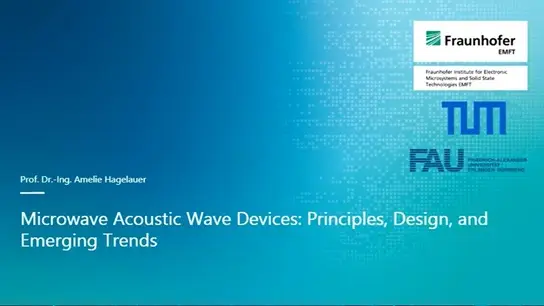Reconfigurable Acoustic Wave Resonator Based RF Filtering Architectures for the Next Generation of Multifunctional Wireless Systems
Dimitra Psychogiou
-
Members: FreeMTT
IEEE Members: $9.00
Non-members: $14.00Length: 01:06:51
13 Jun 2022
Abstract:
Acoustic-wave-resonator (AWR)-based RF filters have been the core filtering technology of cellular RF transceivers with more than fifty filtering devices currently being present in an ordinary smartphone. Emerging wireless communications (beyond 5G) are expected to require an even larger number of filters (> 100) in their RF front-ends able to support wider operational bandwidths, multiple bands as well as being adaptive to the spectrum/user needs. Current SAW- and BAW-based technologies exhibit narrow fractional bandwidth (constrained by the electromechanical coefficient kt2 to 0.4-0.8kt2) and static transfer functions. Furthermore, they are only able to realize a certain types of transfer functions (quasi-elliptic bandpass) due to their poles and transmission zeros being constrained by the kt2. Considering the aforementioned limitations, this webinar will introduce a new concept to realize AWR filters with advanced functionality using hybrid acoustic-wave-lumped-element resonators (AWLRs. The AWLR concept allows for filters with: i) enhanced FBW (>kt2), ii) small physical size, iii) high-Q (1,000-10,000), iv) arbitrary transfer functions and iv) tunable responses. The webinar will present the fundamental foundations of the AWRL concept through circuit analysis followed by coupled-resonator-based synthesis. Various AWLR-based filtering topologies will be illustrated in terms of RF design, synthesis (coupling matrix approach) and experimental performance with a major focus on bandpass- and bandstop-type responses. Afterwards, we will discuss advanced multi-band architectures as well as filters with reflectionless passband and stopband characteristics. Novel AWR filter concepts with flat and negative group delay will also be presented. Lastly, we will introduce unique tuning concepts leading to transfer functions with multiple levels of RF tuning namely bandwidth, out-of-band isolation, all pass and all-stop responses.
Bio:
Prof. Dimitra Psychogiou received the Dipl.-Eng. degree in Electrical and Computer Engineering from the University of Patras in Greece in 2008, and the Ph.D. degree in Electrical Engineering from the Swiss Federal Institute of Technology (ETH) in Switzerland in 2013. In 2016, she joined the Department of Electrical, Computer and Energy Engineering at the University of Colorado Boulder, USA as an Assistant Professor, where she led the research of the Adaptive Microwave Lab. Since 2020, she is a Professor of Electrical and Electronic Engineering at the University College Cork and the Head of the Advanced RF Technology Group at Tyndall National Institute in Cork, Ireland. Her research focuses on reconfigurable microwave and millimeter-wave RF filters and passive RF components for multi-functional RF front-ends, broadband antenna arrays, interference suppression techniques, non-reciprocal RF components, acoustic wave resonator-based RF filters and the application of digital additive-manufacturing technologies for the realization of versatile RF systems. Prof. Psychogiou is the recipient of the 2020 NSF CAREER Award, the 2020 URSI Young Scientist Award, and the Junior Faculty Outstanding Research Award from UC Boulder. Prof. Psychogiou serves the Chair of the Microwave Controls Techniques Committee (MTT-13) and the Secretary of USNC-URSI Commission D. She is currently an Associate Editor of the IEEE MICROWAVE AND WIRELESS COMPONENTS LETTERS (MWCL) and the International Journal of Microwave and Wireless Technologies (IJMWT) and serves on the Technical Review Board for various IEEE and EuMA conferences and journals.
Acoustic-wave-resonator (AWR)-based RF filters have been the core filtering technology of cellular RF transceivers with more than fifty filtering devices currently being present in an ordinary smartphone. Emerging wireless communications (beyond 5G) are expected to require an even larger number of filters (> 100) in their RF front-ends able to support wider operational bandwidths, multiple bands as well as being adaptive to the spectrum/user needs. Current SAW- and BAW-based technologies exhibit narrow fractional bandwidth (constrained by the electromechanical coefficient kt2 to 0.4-0.8kt2) and static transfer functions. Furthermore, they are only able to realize a certain types of transfer functions (quasi-elliptic bandpass) due to their poles and transmission zeros being constrained by the kt2. Considering the aforementioned limitations, this webinar will introduce a new concept to realize AWR filters with advanced functionality using hybrid acoustic-wave-lumped-element resonators (AWLRs. The AWLR concept allows for filters with: i) enhanced FBW (>kt2), ii) small physical size, iii) high-Q (1,000-10,000), iv) arbitrary transfer functions and iv) tunable responses. The webinar will present the fundamental foundations of the AWRL concept through circuit analysis followed by coupled-resonator-based synthesis. Various AWLR-based filtering topologies will be illustrated in terms of RF design, synthesis (coupling matrix approach) and experimental performance with a major focus on bandpass- and bandstop-type responses. Afterwards, we will discuss advanced multi-band architectures as well as filters with reflectionless passband and stopband characteristics. Novel AWR filter concepts with flat and negative group delay will also be presented. Lastly, we will introduce unique tuning concepts leading to transfer functions with multiple levels of RF tuning namely bandwidth, out-of-band isolation, all pass and all-stop responses.
Bio:
Prof. Dimitra Psychogiou received the Dipl.-Eng. degree in Electrical and Computer Engineering from the University of Patras in Greece in 2008, and the Ph.D. degree in Electrical Engineering from the Swiss Federal Institute of Technology (ETH) in Switzerland in 2013. In 2016, she joined the Department of Electrical, Computer and Energy Engineering at the University of Colorado Boulder, USA as an Assistant Professor, where she led the research of the Adaptive Microwave Lab. Since 2020, she is a Professor of Electrical and Electronic Engineering at the University College Cork and the Head of the Advanced RF Technology Group at Tyndall National Institute in Cork, Ireland. Her research focuses on reconfigurable microwave and millimeter-wave RF filters and passive RF components for multi-functional RF front-ends, broadband antenna arrays, interference suppression techniques, non-reciprocal RF components, acoustic wave resonator-based RF filters and the application of digital additive-manufacturing technologies for the realization of versatile RF systems. Prof. Psychogiou is the recipient of the 2020 NSF CAREER Award, the 2020 URSI Young Scientist Award, and the Junior Faculty Outstanding Research Award from UC Boulder. Prof. Psychogiou serves the Chair of the Microwave Controls Techniques Committee (MTT-13) and the Secretary of USNC-URSI Commission D. She is currently an Associate Editor of the IEEE MICROWAVE AND WIRELESS COMPONENTS LETTERS (MWCL) and the International Journal of Microwave and Wireless Technologies (IJMWT) and serves on the Technical Review Board for various IEEE and EuMA conferences and journals.


